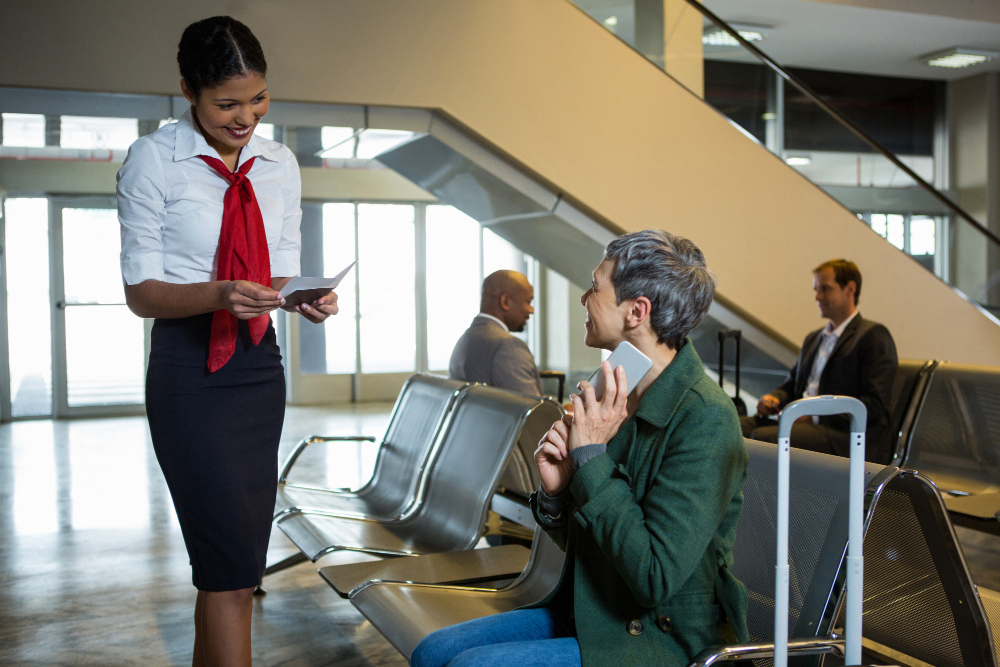
The aviation industry has long been a magnet for young aspiring professionals, allured by its abundant job opportunities, competitive salaries, and lucrative perks. What makes it more appealing is that you can start your career at a very young age and climb the ladder of success quickly in life.
Aviation colleges in India offer a diverse array of aviation courses that cater to various facets of this dynamic industry. Among these offerings are the Diploma in Aviation Hospitality and Aviation Management, BBA in Aviation Operations, and MBA in Aviation Management. Some institutions even provide International Air Transport Association (IATA) authorized courses, greatly enhancing the prospects of a thriving global career in aviation.
For many young individuals, especially aspiring female professionals, the dream of becoming a cabin crew member holds a unique charm. As a part of the cabin crew,
- • one can traverse the globe, interact with diverse cultures,
- • Enjoy perks such as discounted airfare, meals, and accommodations
- • An air hostess can move forward with their career even after retirement by becoming an instructor in a reputed air hostess training college,
However, some budding talents may be deterred by a fear of flying. For them, the role of ground staff presents an equally rewarding avenue.
But how does one distinguish Cabin Crew from Ground Staff? Let's delve into this distinction in the following sections.
Cabin Crew
Cabin crew members operate within the confines of the aircraft, soaring at 36,000 feet above sea level. Their work environment includes navigating changing time zones, enduring long flights, and interacting with passengers.
- • Their primary mission is to ensure the safety and comfort of passengers during the flight.
- • Before takeoff, cabin crew members ensure that the aircraft is impeccably clean and well-stocked with food and safety equipment.
- • Their initial tasks involve warmly greeting passengers, assisting with seating arrangements, and aiding with luggage.
- • However, their paramount responsibility is the safety of passengers. This includes educating and guiding passengers on safety protocols, securing cabin luggage, and ensuring seat belts are fastened during critical phases of the flight, such as turbulence, takeoff, landing, or emergencies. Cabin crew members are rigorously trained to evacuate the aircraft if needed, underscoring their unwavering commitment to passenger safety.
In contrast, Ground staff play a pivotal role in airport operations, catering to various aspects of airline services.
- • Their responsibilities span both pre-flight and post-flight phases and include tasks like ensuring the smooth handling of luggage, upholding airport security, managing airport facilities, coordinating aircraft movements, and assisting passengers with diverse needs.
- • Ground staff members are the face of the airport, fielding queries, providing information, assisting passengers with special requirements, and ensuring the cleanliness of aircraft interiors after flights. They are also engaged in restocking aircraft with food and beverages, overseeing luggage check-ins, selling tickets, and handling reservations and cancellations.
In terms of compensation, cabin crew typically enjoy higher earnings compared to ground staff. In India, the average annual salary for cabin crew ranges from INR 4-10 Lakhs, with the potential to climb to around INR 12 Lakhs with experience. Conversely, the average annual salary for ground staff in India varies from INR 2 Lakhs to INR 9 Lakhs.
Cabin crew members ensure the safety, comfort, and satisfaction of passengers during the flight. Both roles are indispensable for the seamless operation of an airline and contribute significantly to the overall travel experience of passengers, starting from their arrival at the airport until they reach their chosen destination.
 CCPTR,
CCPTR, 

 National Skill Development Corporation
National Skill Development Corporation Ministry of Education
Ministry of Education MoE's Innovation Cell
MoE's Innovation Cell Institution’s Innovation Council
Institution’s Innovation Council AICTE
AICTE


Leave a comment